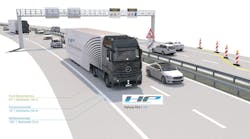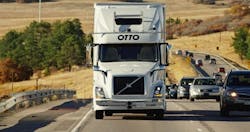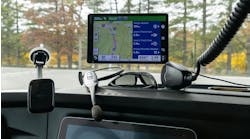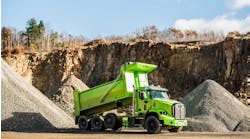A new study by global consulting firm Frost & Sullivan indicates that a growing variety of start-up ventures are fomenting broad change in the global trucking industry – altering everything from how trucks operate, including driving themselves, to how freight shipments are booked, paid for, and moved.
“The fact is that trucking offers a huge potential for being disrupted,” Sandeep Kar, global vice president for research and mobility at Frost & Sullivan, told Fleet Owner.
In the firm's report, entitled, Start-ups Disrupting Global Connected Truck Market 2016-2017 Kar said there is a "huge upside for improvement [in trucking] for it is not the most optimized industry – there are so many moving parts moving at sub-optimal speeds."
He added that consumers and shippers today are being “born into reality called Amazon” where the low-cost yet extremely speedy delivery of all manner of goods is now an everyday expectation.
“That’s why these start-ups are moving the needle and driving the innovation,” he pointed out. “They are here to drive efficiencies, drive opportunities to lower TCO [total cost of operations], enhance safety, and to increase revenue potential for [industry] stakeholders.”
What is attracting all of these new start-ups to trucking – firms such as Transfix, Trucker Path, Otto [newly purchased by Uber], MyLumper, Peloton, Loadsmart, and many others – is that while hauling freight by truck is “not a very sexy industry” in Kar’s words, it moves $700 billion worth of a freight per year in the U.S.; a number that gets people’s attention.
From that perspective, then, and using the “connected truck” as a launching pad of sorts for a variety of services, Wallace Lau, industry principal with Frost & Sullivan and primary author of this study, expects industry-wide “disruption” of the traditional freight world by start-up companies to be concentrated in five areas:
- Autonomous or self-driving truck technology;
- Video-based safety systems;
- So-called “utility” applications for smart phones, largely driver-focused;
- Fleet management solutions;
- Digital freight brokering.
Altogether, those markets are expected to offer big revenue opportunities over the next year, rising from $10 billion today to roughly $245 billion by 2025, according to Frost & Sullivan’s projections.
Lau notes that $210 billion of that future $245 billion market is going to be based solely on digital freight brokering.
At the same time, he said a “new use of telematics” by digital freight brokers could disrupt how that technology is deployed in trucking.
“There’s always been a cost barrier with telematics in terms of hardware and monthly fees,” he explained.
“Now digital freight brokers can come in not only with lower fees but offer a wide variety of telematics services basically for free, just for using their [freight brokering] service,” Lau said. “These new [digital] brokers get a lower commission as their costs are lower and for that also offer location-based tracking, ETA [estimated time of arrival] notices, hotel rate shopping [for drivers], parking spot location, and [vehicle] prognostics. It is similar to Netflix vs. Blockbuster; all of sudden center of gravity shifts. And that could be a game changer for fleets.”
It could be a “game changer” for truck manufacturers, too, he stressed, as technology-focused start-ups could help OEMs reduce research & development spending by 20% to 30% and cut anywhere from three to five years off the time-to-market pipeline.
That’s critical because Lau said “connected trucks” could be the norm in the future. Right now, according to Frost & Sullivan survey data, nearly 40% of fleet managers feel connected trucks are a “must have” item. As a result, the firm expects 35 million trucks worldwide will be “connected vehicles” by 2020.
“With smart roads and smart cities, the smart truck will be a necessity,” he emphasized, as connected trucks will allow users to more easily pay for fuel, toll, parking, infotainment, and many more services in real-time with fewer hassles. For OEMs, they offer opportunities “beyond point-of-sale,” Lau added, notably in terms of warranty management.
“The entire organization within the fleet – dispatch, drivers, maintenance, and operations – all are being connected with new apps and software to shipments,” he told Fleet Owner.
“This is all being moved into digital freight market. Right now, a lot of time is being wasted with current [freight shipment] process,” Lau said. “Having everything automated with connectivity will help overall by making trucking more efficient. It’s about the optimization of assets; every dollar saved is key.”





